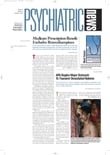At a holiday reception I recently attended, I fell into conversation with a sophomore undergraduate who told me that she was majoring in psychology. When asked about her long-term career plans, she said that she was going to be a psychologist. She went on to explain that she had arrived at her decision not because of her course work or teachers' influence, but because she was in therapy with a psychologist who was providing her with excellent care. She was also seeing a psychiatrist, but for medication only. Of course, I told her that I was glad she was doing well and that she was receiving such good care.
As we continued to talk, it was evident that the young woman was well informed about psychologists and their quest to obtain prescribing privileges, so she added that she would probably have the option of prescribing medications by the time she was finished with training. Someone nearby commented on the controversy over antidepressants and their possible link to suicide and casually remarked that maybe she should think about coming off the medications anyway.
I have written for years on the subject of split treatment and the difficulties inherent for clinicians and for patients. This conversation with the student, however, brought to light for me new difficulties with which we must contend as we try to educate the public about what we do.
There are very real public relations problems that are now being added to the ones we have traditionally known—among them, that the public does not know the differences between psychologists and psychiatrists; that having a psychiatric diagnosis is stigmatizing; and that it is difficult to access good care because of such barriers as finances, geography, inadequate systems of care, and cultural barriers (as APA pointed out in its 2003 document,“ A Vision for the Mental Health System”).
Prime among the new issues that we must address include the black-box warnings on antidepressants, particularly for children. Without balanced information, the public will become increasingly reticent to take psychiatric medications or allow their children to take them. Despite some drawbacks, direct-to-consumer marketing, which has helped turn many antidepressants into household names and educated the public about their availability and efficacy, is declining. If psychiatrists are associated with medications, are we as tainted as the medications we provide?
Another issue has to do with educating the public about psychiatric care. One example is related to the vignette I just described. Psychiatrists and the residents we teach always use psychotherapy with patients, whether it is in a 50-minute or 10-minute session, whether it is for integrated or split treatment. In fact, psychiatrists who provide medication management in a split-treatment arrangement must exercise a great deal of skill at psychotherapy since often they must size up situations and symptoms more quickly and with less information than patients seen in traditional treatment.
That skill level and the risks that physicians take in prescribing medications to patients may be under-appreciated and undervalued, even more so now than ever before, as a variety of health care professionals has successfully sought prescribing privileges from state legislatures without having to graduate from medical school.
For those of you who are wondering how this encounter with the college sophomore turned out, not to worry. I went into my recruitment mode—which is easy to do at this time of year. I told her why going to medical school and becoming a psychiatrist has allowed me to decide and administer the most effective and appropriate treatment for each patient, while taking into account any concomitant medical issues the patient might have or may develop down the road—in other words, that psychiatrists' medical education, background, and set of skills prepare us to take care of the “whole person.” By the end of the conversation, I hadn't recruited her into psychiatry/medical school, but at least maybe she had more of an appreciation for what it took to be a psychiatrist.
I am sure you encounter these kinds of situations as well, and I'd appreciate hearing how you respond to them. Complicated issues, complicated times.
The APA report “A Vision for the Mental Health System” is posted online at<www.psych.org/news_room/press_releases/visionreport040303.pdf>.▪

